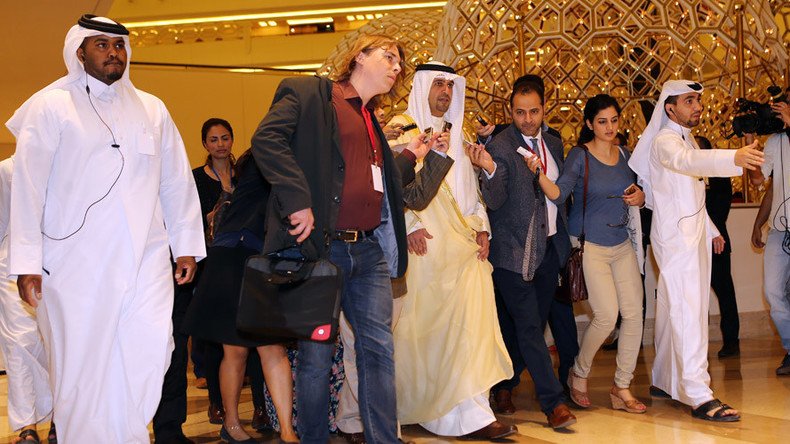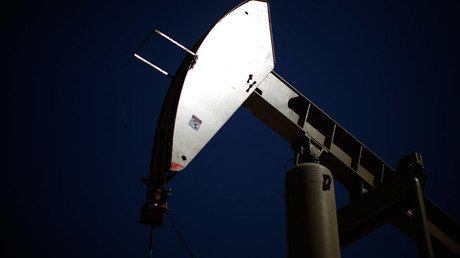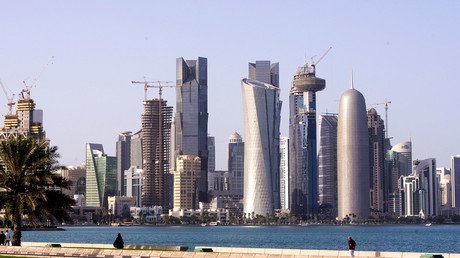Doha oil-freeze talks: 'Iran plays crucial role'

If Iran refuses to cap oil production until they regain the pre-sanction quota, a freeze by other producers won’t lead to a substantial price rise, given current extremely high production levels, says Paolo von Schirach of the Global Policy Institute.
Major oil producers, OPEC and non-OPEC members, have gathered for a meeting in Doha, Qatar, to discuss a plan to stem a global surplus of oil, which has hit both prices and crude producers’ economies hard. Exporters have agreed to freeze their productions in order to boost the economy, while Iran – which is absent from the talks – opposes the step. Saudi Arabia, which is highly dependent on revenues from oil, says that it will freeze its production only if Tehran agrees to the deal.
RT: Do you think Iran plays a crucial part in the negotiations in Doha?
Paolo von Schirach: I think so, because Iran at this point is sort of the critical variable. Depending on what the Iranians decide, that will really affect the global prices. And here is the thing: Iran has declared that it is not going to consider, unless they’ve changed their mind now, any participation in this freeze until such time as they have regained their pre-sanction quota; and that is a very substantial increase- millions of barrels.
If their position doesn’t change, then I’m afraid the willingness of Saudi Arabia, and other OPEC counties, potentially with the participation of Russia, saying “ok, we are going to freeze our production at current levels” doesn’t really mean a lot, because those levels are already extremely high. Unless there is a hope that markets can detect that production is going to go down in a substantial way, maybe one or two million barrels at least a day globally – this will not really impact prices for quite a while. Obviously, what certain market participants are looking for is a substantial rise in oil prices. I don’t really see that happening without the full participation of Iran and indeed Iraq, as well.
RT: Saudi Arabia is ready to freeze its crude production, but only if all major producers agree on those conditions, including Iran. What’s your take on that?
PvS: I think the Saudis are being very, very optimistic and presenting a good face to the world… They are running a huge budget deficit; they had to issue bonds to finance their budget; they are dipping into their so-called a rainy-day fund – meaning their large reserves, which they still have, but the depletion continues. At the same time they are engaged in an extremely ambitious, but in my mind uncertain plan to globally reform the Saudi economy. I don’t know that they can do all these things and in particular that they can do them fast enough to lessen their dependence on prices.
Tom Adshead, energy expert: “Russia tried 10 years ago to create a long-term relationship with OPEC – it didn’t work very well back then. The fact that they are meeting, the fact that they are talking is a huge and symbolic step and any agreement will be a plus. Just stabilize the markets and make it clear what the intentions of all the players are.”
Of course, Saudi Arabia still makes money. They are a very low-cost producer. But the point is that their dependence on oil revenue is extremely high. Almost every citizen in Saudi Arabia benefits one way or the other from government largess that’s coming from oil revenue. If that oil revenue, projected to stay lower for a few number of years, and that is a possibility, that is a scenario, this would certainly put pressure on the Saudi government.
RT: Could Saudi Arabia change the course here?
PVS: Of course they could. Saudi Arabia historically has played this role. On other occasions, in other circumstances, in which oil prices were downed because of recessions, too much production, etc., they simply reduced production and agreed, and OPEC countries one way or the other followed that: they would proportionately or on some quotas reduce production. Less production means tighter supply, and therefore higher prices. This time around they refused to do so.
Claiming that their objective is to maintain market share as opposed to stabilize prices, I am not quite sure what the game plan here is, what they are trying to achieve, if their strategy is to hurt Iran, to hurt the US and its so-called unconventional oil production, shale… But certainly they could change course.
They could convene a meeting, or even not convene a meeting and say: “We’re going to cut our oil production by one million barrels.” They produce 10 million plus. If they cut one million, that means one million less in world global supply, and that would immediately boost prices. Will they do this? I am not sure. Maybe not now, because they may feel confident that they have enough elasticity in terms of their financial reserves and their ability to borrow in international markets that they don’t really need to do this.
Professor Michael Klare, author and expert on natural resource issue agrees that Iran’s participation in the current talks in Doha is “crucial.” In his view, Saudi Arabia is interested in reaching some kind of an agreement at the gathering, but they don’t want a deal “in which other countries will take advantage of their efforts by boosting production.”
“They don’t want an agreement that would allow Iran or somebody else for that matter to boost their production higher and therefore gain more market share taking it away from Saudi Arabia. They don’t want an agreement in which they will lose market share. That is why they are so concerned about Iranian participation,” he told RT.
Speaking about the perspectives of the Saudi economy in the long term, Klare said Riyadh understands that in about a decade or two the demand for oil will begin to decline because of climate change and promises made by the participants of the Paris Conference 2015 to reduce their emissions of greenhouse gases from burning fossil fuels.
Therefore, the Saudis “want to make as much money as they possibly can now, while there is still a market for oil, and to use the proceeds from that to buy investments around the world, to invest in other industries to prepare for the day, when there isn’t a market for oil,” he told RT.
The statements, views and opinions expressed in this column are solely those of the author and do not necessarily represent those of RT.














